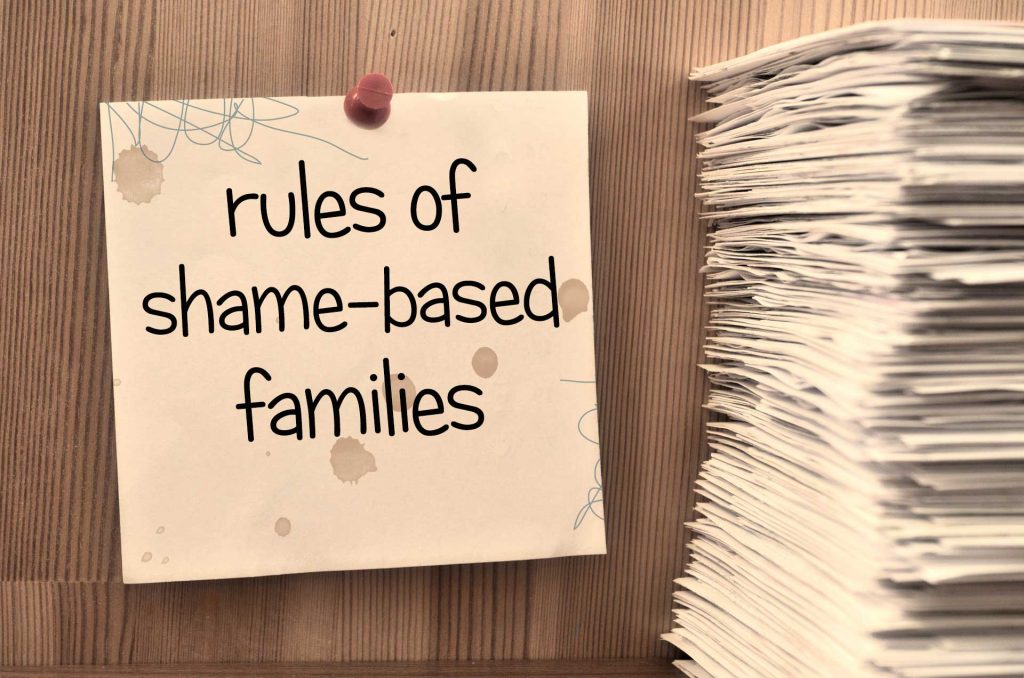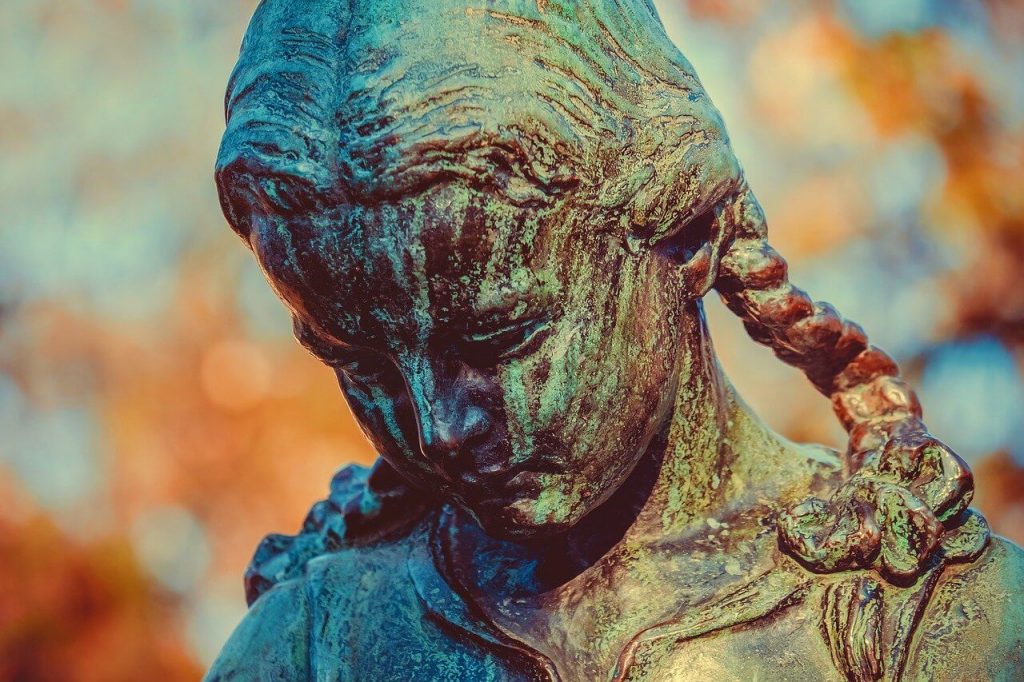How Attachment Wounding Leads to Shame

Shame is the result of attachment wounding; you might say it starts with a broken heart. Attachments are the personal connections formed with our first caregivers. If these early relationships are dysfunctional, a life-long struggle with shame is a likely outcome. Researcher Brené Brown defines shame as “the intensely painful feeling or experience of believing that we are flawed and therefore unworthy of love and belonging – something we’ve experienced, done, or failed to do makes us unworthy of connection.”1 But, as an infant or young child, how can we possibly make such a determination? Well, we really don’t. This is how it works: Our core sense of self-worth and love is established during the developmental stages of infancy and childhood.2 If we reach out to be loved and we are loved in return, we will probably develop a healthy sense of self-worth and will believe ourselves to be lovable. If, however, we reach out to be loved and we are not loved in return, we internalize the belief that we are not lovable or worthy of being loved. As young children, we cannot even speak or attach words to the feelings, but they become part of us, nonetheless. This is why I say that attachment wounding leads to shame. Essentially, as a result of feeling unloved and rejected, shame enters our core and creates a filter through which we view life.

It’s like wearing a pair of sunglasses that you cannot remove. I talk about this a bit in another blog post.3 The filter created by the sunglasses colors everything. Of course, shame is not just about not being lovable – it is also about being unworthy, which encompasses so much more of our identity. Real sunglasses filter what we see out there in the big, wide world. External to us. But feeling unworthy is about what we believe is inside of us. Our shame-sunglasses filter both, and as we look inward, our self-image and feelings must pass through the lens of our shame. It can be brutal. The shame filter is so strong that we self-identify with the negative words spoken over us without even realizing it. Maybe Mom says, “You’re a slob! You are the laziest thing in the world!” Heard often enough (or even once, depending on the circumstances), we believe it and become it, at least in our soul. We might turn into a neat-freak house-cleaner determined (dare I say, obsessively so?) to prove Mom wrong, but buried deep inside our soul, we believe that we are actually a lazy slob faking the neat-freak life. What began in our childhood as “you” statements made by someone else about us, somehow transforms into “I” statements inside our heads, where we repeat and recycle all that nastiness as truth. And we come to own it. Talk about a no-win situation! Because of these internalized messages, we soon become perfectly capable of shaming ourselves without anyone else’s help.
Wouldn’t you think that since we wear these “shame sunglasses” all the time, we’d find it easy to identify shaming and then avoid our reaction of feeling shamed when someone shames us? But it isn’t that simple, primarily because those early internalized messages are stuck at our core; our reaction, the experience of shame, becomes as unconscious as closing our eyes when something is thrown at us.what shame messages sound like
Shaming behavior exists in every role and position in life, with shaming often expressed in rather obvious ways and sometimes in very subtle ones. Consider these examples of shaming comments we make to ourselves, as well as those we hear from other people:
Shaming and Critical Self-talk
Shaming Words from Others
Of course, this little selection doesn't even begin to scratch the surface, does it? Isn't it interesting, in a say kind of way, how we'll criticize ourselves and "say" things to ourselves that we'd never say to a friend? Most of us wouldn't tell our friend she was fat, an idiot, or pathetic, yet we allow these toxic words free rein in our heads, directed at ourselves. Arenas or categories of shaming include work, home, relationships, sports or other competition, parenting, social media, racial, school, and so much more. Some people are very skilled at backhanded compliments (insults disguised as a compliment), while others use "I'm just being straight with ya" as an excuse to be rude or unkind, getting their shaming moment of glory at someone else's expense. Which reminds me -- It's important to note that a lot of our negative self-talk is actually "other-imposed". What I mean is, someone else said it to you and it stuck, and now you repeat it to yourself. If you grew up hearing what a disappointment you were, by the time you're 25, you don't even realize that you routinely tell yourself that you're a disappointment to people and the world would be better off without you. This is a very important thing to recognize in yourself, if you do it.
5 rules of shame-based families

Sandra Wilson gives 5 rules for shame-based families: be blind, be quiet, be numb, be careful, be good.4 These rules, and their various expressions, become engraved on our little hearts. There are innumerable variations; do any of these seem familiar to you?
Be blind to your perception of truth and reality (e.g. Dad’s not drunk, he’s sick today)
Be blind to mixed messages (I’m doing this [abuse] because I love you)
Be blind to role reversals (Parent is high or otherwise irresponsible, so the child takes on adult roles)
Be secretive – Keeping the family secrets is a major rule in dysfunctional homes. (This essential rule of silence may prevent a survivor from getting help even as an adult, as it has been ingrained in them not to break that code of silence and “tattle” on their family members.)
Be quiet at home – do not discuss what’s wrong here. Pretend our lives are not messed up.
Be silent inside yourself – do not acknowledge, even to yourself, the truth of your abuse
Be numb to your emotions – suppress your feelings, don’t demand, don’t need, don’t want, don’t dream
Be numb to personal boundaries – let us do whatever we wish to you
Be careful – the world you live in (at home) is very unpredictable
Be careful – the world “out there” is full of people who won’t like you and can’t be trusted
Be good – be perfect according to someone else's unrealistic expectations
Be good - don't cause trouble, don't ask for help, don't reveal yourself
How many of these messages (or or others very much like them) are rattling around in your head? Even after lots of counseling and recovery time under my belt, I still have my struggles with some of them. They still creep in and catch me unawares. If you’re an abuse survivor, you can probably identify with that. Maybe you are even (unintentionally) shaming yourself for not doing a better job of keeping those shame gremlins at bay! But think about this for a minute: honestly, doesn’t it make sense that something planted so early in our psyches, something buried so deep in our souls, something that is so much a part of us at our core, puts down really long and tangled roots? I want you to hear this: shame is very hard to eradicate. Nobody is immune to experiencing shame, no matter what kind of wonderful family they had or how emotionally healthy they might be; it’s just harder for those of us who experienced it all the time to ignore it or move past it. Humanity has a long history with shame – Adam and Eve experienced shame after they ate of the fruit in the Garden of Eden (Genesis 3:1-24). Please don’t be hard on yourself if you are “still” working on it and it is “still” hard to deal with.
shame is like an invasive weed
Shame reminds me of an invasive weed that just refuses to be removed. It just keeps coming back, again and again, year after year. The birds have gifted me with one of those in my tiny front garden. We live near a creek, and there are wild grasses, kind of like cattails, growing profusely down the hillside between our house and the water’s edge. They have straw-like, twiggy “leaves” that burst up out of the loam and make a definite visual statement. They are fine where they are, part of the natural heritage of this property and happy in their waterside location. I don’t mind them – as long as they’re outside my everyday range of life. But the birds “dropped” a seed or two into the part of my front yard that I actually want to look nice. And there, in the middle of my pretty yellow tuft of ornamental grass, is The Intruder. Yep – one of those spiky cattail-thingies has established itself quite firmly in the middle of the pretty landscape. I thinks it’s actually called horse-tail, but I’m not positive. At any rate, it doesn’t belong in my ornamental grass, and I am not happy about that. However, no matter how we dig and divide (we’re not using herbicide because of the yellow grass, so this is all manual labor), that Intruder will not stay gone. Its roots are lonnnnng and go deep, tangled around those of the grass I prefer, and it’s almost impossible to tease them apart. It will take hard work – vigilance to catch the new sprouts, faithful repetition of the removal process, and sacrifice of time, achy muscles, and possibly some leaves and roots from the good plant – to see the Intruder removed for good. And about the time I relax and rejoice over my success, the birds will gift me with another seed in another corner of the garden. And I’ll start again over there. Recovery is like that. And I’ll benefit next time, from the challenges I overcame this time. It may not be easier, exactly, but I will have more experience, and that will help.

the real tragedy of shame
The real tragedy of shame is that it is a hallmark of emotional wounding that results from people whom a child should be able to trust, violating that trust and hurting the child with words, neglect, or physical harm. We’ll talk about the different kinds of trust-violation in another post, but this can occur through chronic neglect, abandonment, sexual abuse, words, substance abuse in the home, in addition to a number of other ways.
Have you heard the children’s song, “stick and stones can break my bones, but words will never hurt me!”? Research shows us that quite the opposite is true.5 Emotional and psychological wounds can have longer-lasting effects than physical injury. I’m not minimizing the harm of physical violence, but I want to increase your awareness of just how potent those invisible emotional bruises can be. And non-physical elements such as neglect or hurtful words qualify as “sticks and stones,” too. They might be invisible, but they can break down our souls – spiritually, psychologically, and emotionally – just as surely as rocks or sticks from the outdoors break actual bones. And they do.
The earlier in life someone threw those invisible stones at you, and the closer your relationship with them, the deeper the attachment wounding will be. What do those stones look like? Using childhood abuse as an example, it might be that at a very young age you were blamed for things that went wrong, or you were not believed, or you were discounted and ignored. You were taught that only perfect children were “good.” Those children would be able to please your parents because they would never stir up unpleasantness, would never make messes, would eat or not eat as was convenient for your parents in the moment, would never wet the bed, get bad grades, oversleep, misbehave in church, get their dress dirty or track mud into the house . . . do you get the point? These are the actions of regular, healthy children! This is what children do! But if you did these typical child-things, you were not only called on it (unrealistically) you were BAAAAAAAD for being that way. And you internalized this message, which is another thing that children do. Children are supposed to internalize their childhood messages; it’s part of bonding and growing within the family. But instead of bonding in healthy ways that strengthen us, we have heard and internalized twisted messages from early caregivers’ treatment of us: we are called disgusting, disappointing, even unwanted; poor excuses for what children should be. We cannot forget the criticisms, no matter how hard we try. They echo in our hearts and minds, replaying their discordant melodies ad infinitum: “you are bad, you are unlovable, nobody will ever want you, you are less-than anything and utterly without value.”

the Voice of shame
For most of us, shame originates with a Voice. Even before we have voices to express ourselves, or a vocabulary of words to put to things, voices from outside of us are influencing us. The Voice of Shame might sound like our parents, our siblings, or other caregivers or early influences in our lives. It can even be heard in utero – research in developmental trauma supports this.6 Whatever our stage of life, the words of this trusted person wound us. An infant who is screamed at because it cries too much. The meaning registers long before the baby has words. Babies are supposed to cry. It is the caregiver’s responsibility to respond with care to the baby’s cries and tend to their needs. The first-grade girl who is yelled at for burning dinner. First-graders should not be responsible for cooking dinner. The young man whose father scorns his interest in science rather than football, calling him a “sissy” and worse. Of course, the Voice of Shame can communicate with devastating effect when it is silent, too. Sometimes the absence of words wounds us; silent withdrawal can be worse than overt punishment.7
Shame is the result of being corrected, criticized, scolded, second-guessed, punished, condemned, and “improved” so constantly that we internalize the over-arching message of not being good enough – ever. And hopelessly so. After all, if we did grasp at a sliver of hope, as soon as we did something right, the Voice would point out a host of things we did wrong. The same gravelly Voice of Shame that tells me I'm not worth the trouble of improving murmurs that if I was a better person, I would have embraced all these positive changes and I’d be all better. Since I’m not, the Voice of Shame says, I am horribly, hopelessly flawed. Not even God, the Voice taunts, wants anything to do with me.
I think part of our internal struggle with feeling worthless is caused by the obvious conclusion we draw, as victims, that we didn't matter enough to God for Him to intervene. Right? Why does God allow innocents to suffer? Why do bad things happen to good people? Why does evil exist? I have written an article on where was God in my abuse,8 because it is one of the top questions of abuse survivors. Really, though, I don't think I can do justice to those questions. Every one of us (survivors) has to wrestle this one out for ourselves with God or our Higher Power. If you want to pursue these questions further, there are many excellent scholars who have written and spoken on those subjects. I can point you to Scriptures that tell us about the Lord's compassion, His faithfulness, and His love. I don't understand why abuse occurs any more than you do, but I believe He was not looking the other way or shrugging and saying, "bummer for you, kid." I believe it broke His big ol' heart. And I believe He is with us in every step of our recovery. The Bible says that God delights in us (Psalm 18:16-19; Zephaniah 3:17); that He loves us (John 3:16; 1 John 3:1); and that he doesn’t take maltreatment of little ones lightly (Matthew 18:6). Jesus saw enough value in you and me that he went to the cross so we could be reconciled to God and spend eternity with Him. Your parents (or others) might not have valued you, but God does.
I want you to hear me: the Voice of Shame is the voice of the devil himself. It is an evil hiss; a nasty, swirling vortex of dark thoughts and shadowy lies that demand relentless perfection. The Voice of Shame is how the enemy of our souls overwhelms us with visions of failure and words of condemnation. His goal is to separate us – to separate us from God and from each other. Through the medium of shame, he is wildly successful. But that can change. You see, the antidote to the devil’s lies and schemes is grace. It is grace that reminds us that we need not be perfect. Our early caregivers might have demanded perfection, but God does not. Grace says that while we were yet sinners, Christ died for us (Romans 5:8). God is quite familiar with shame; as I said earlier, when Adam and Eve sinned and became separated from God, the first emotions they experienced were fear and shame (Genesis 3:1-24). Note that God did not shame them; he simply enacted consequences for their disobedience. Jesus also understands shame very well. He endured the shame of the cross so you and I could be reconciled to God once and for all (Hebrews 12:2).

acceptance removes shame
Shame is a gi-normous topic, so you can count on me talking about it again in future articles. But we have to start somewhere, right? I hope this "somewhere," this article gives you some insight into the ways that shame begins and worms its way into the deepest parts of our being. Humans are, by design, relational beings -- it is no accident that shame is all about broken relationships! Healthy ones help and support us, and unhealthy ones leave us empty and demoralized. Isolated. The good news, though, is that recovery is totally possible, although it isn’t easy. Resources like counseling, well-researched materials, and support groups like Al-Anon or Celebrate Recovery can work wonders with our painful past and help reduce the Voice of Shame to a whisper. Richard Winters, in his book Perfecting Ourselves to Death, refers to the restoration of fellowship, and more specifically, to acceptance, as a means of removing shame.9 Support groups can be great places to find acceptance. I remember when I joined Celebrate Recovery in 2004. The issues I needed help with were shame-related, but back then shame was rarely mentioned as a problem, much less as a primary recovery issue. Nowadays the role of shame in our various problems is more widely recognized. Please consider giving it a try; I understand how frightening it can be to think of joining a support group program (I had a first day just like anyone else, and it was scary to open up to people), but it is in relationship we were hurt, and it is in relationship that we will heal. You're already doing hard things! Life is hard when you are stuck in the quicksand of traumatic memories and shame. Consider doing something that is also hard (getting help) but moves you out of the quicksand onto solid ground. In our recovery journey from shame, with others at our side to encourage and accept us, we can safely revisit that terrifying vortex of pain and lies and – after much emotional pain and hard work – emerge into the sunlight of God’s grace and a hopeful future. It is worth it. You are worth it.
(1) https://brenebrown.com/blog/2013/01/14/shame-v-guilt/
(3) https://buriedtreasure.me/procrastination-the-trauma-connection/
(5) https://www.apa.org/news/press/releases/2014/10/psychological-abuse
(6) https://psychcentral.com/blog/emotional-trauma-in-the-womb/
(7) https://www.healthline.com/health/silent-treatment#when-its-abusive
(8) https://buriedtreasure.me/where-was-god-when-i-was-abused/
(9) https://www.christianbook.com/perfecting-ourselves-pursuit-excellence-perils-perfectionism/richard-winter/9780830832590/pd/32597?event=ESRCG
(10) https://www.celebraterecovery.com/

Let's Chat!
What shame-based issue do you struggle with most?
What is your next step toward recovery?
Drop me a comment below and let me know!